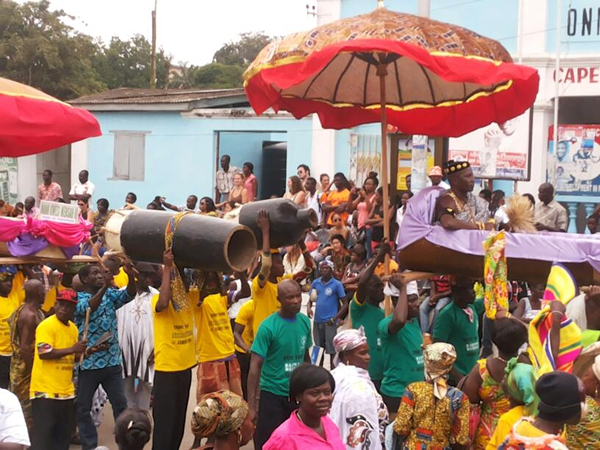
Discover the rich traditions of the Fetu Afahye Festival in Cape Coast, Ghana—a vibrant celebration of purification, community, and cultural heritage.
Introduction
Every September, the historic city of Cape Coast in Ghana comes alive with the vibrant colors, rhythms, and traditions of the Fetu Afahye Festival. This annual event is more than just a celebration; it’s a profound expression of gratitude, purification, and unity among the people of the Oguaa Traditional Area. Rooted in centuries-old customs, Fetu Afahye offers a unique glimpse into the rich cultural tapestry of the Fante people, drawing visitors from around the world to partake in its festivities.
Origins of the Fetu Afahye Festival
The Fetu Afahye Festival traces its roots back to a time when the Oguaa people faced a devastating plague. In their quest for relief, they turned to their 77 deities, performing rituals and cleansing ceremonies that eventually led to the eradication of the disease. The term “Fetu” is derived from “efin tu,” meaning “removal of dirt,” symbolizing the purification of the land. Since then, the festival has been celebrated annually to honor the gods and commemorate the community’s deliverance. [1]
Evolution and Development
Over the years, Fetu Afahye has evolved from a purely religious observance to a grand cultural festival. While maintaining its spiritual significance, the festival now encompasses various activities that showcase the rich heritage of the Fante people. These include traditional dances, music performances, art exhibitions, and culinary displays, all aimed at preserving and promoting the community’s identity.
Significance and Community Impact
The Fetu Afahye Festival serves multiple purposes:
- Spiritual Renewal: Rituals and ceremonies are performed to purify the land and seek blessings for the coming year.
- Cultural Preservation: The festival provides a platform for showcasing traditional customs, attire, and practices.
Community Cohesion: It brings together people from all walks of life, fostering unity and a sense of belonging. - Economic Boost: The influx of tourists stimulates local businesses and promotes Cape Coast as a cultural destination. [2]
Challenges and Contemporary Adaptations
Despite its significance, the Fetu Afahye Festival faces challenges such as modernization, which threatens to dilute traditional practices. Additionally, logistical issues like crowd management and environmental concerns have arisen due to increased attendance. In response, organizers have implemented measures to balance tradition with contemporary needs, ensuring the festival’s sustainability and relevance.
Legacy and Modern Relevance
The Fetu Afahye Festival remains a testament to the resilience and cultural richness of the Fante people. Its continued celebration underscores the community’s commitment to preserving their heritage while adapting to modern times. As a symbol of unity and purification, the festival continues to inspire generations, reinforcing the importance of cultural identity in an ever-changing world.
Conclusion
Q5: How has the festival adapted to modern times?
A5: Organizers have incorporated contemporary elements such as beauty pageants and modern music performances while maintaining traditional rituals and customs.
For more information on Ghanaian festivals, visit Visit Ghana.
The Fetu Afahye Festival is more than a cultural event; it’s a living tradition that encapsulates the spirit, history, and aspirations of the Cape Coast community. Through its rituals, celebrations, and communal activities, the festival offers a profound insight into the values and resilience of the Fante people. As it continues to evolve, Fetu Afahye stands as a beacon of cultural pride and unity, inviting all to partake in its rich tapestry of traditions.
FAQs
Q1: When is the Fetu Afahye Festival celebrated?
A1: The festival is celebrated on the first Saturday of September each year in Cape Coast, Ghana.
Q2: What is the significance of the Fetu Afahye Festival?
A2: The festival commemorates the purification of the land from a historic plague and serves as a time for spiritual renewal, cultural celebration, and community unity.
Q3: Can tourists attend the Fetu Afahye Festival?
A3: Yes, the festival is open to all, and visitors are encouraged to experience the rich traditions, performances, and culinary delights of the celebration.
Q4: What are some key activities during the festival?
A4: Activities include traditional dances, music performances, art exhibitions, communal clean-up exercises, and the grand durbar of chiefs.
Q5: How has the festival adapted to modern times?
A5: Organizers have incorporated contemporary elements such as beauty pageants and modern music performances while maintaining traditional rituals and customs.
RECOMMENDED ARTICLES
- oguaa-fetu-afahye-festival
- Akan Day Names: Identity in Every Birth
- apoo-festival-purification-and-culture-in-bono
- Kundum Festival: Harvest & Renewal in Ghana
USEFUL LINKS
